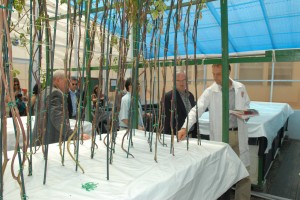
A onetime PerkinElmer and Intel Corp. engineer has planted the seeds for a startup aiming to employ as many as 300 people in Bridgeport working a high-tech lettuce “factory.”
MetroCrops L.L.C. is in the final stages of securing an initial Small Business Innovation & Research (SBIR) grant from the U.S. Department of Agriculture, as the company pursues what founder Steve Domyan calls “urban, high-density indoor farming.”
The company is based in Norwalk and is on the cusp of establishing a test bed in Storrs at the University of Connecticut”™s business incubator. Metrocrops plans to use hydroponics techniques to grow produce under light-emitting diodes (LEDs) programmed to bathe plants in optimal lighting conditions.
MetroCrops is hardly the first entity to envision indoor farming, with the roots of hydroponics reaching all the way back to a 17th century treatise published by Francis Bacon. More recently, some have tested the viability of “aeroponics” in which plants receive nutrients via a sprayed mist.
Some see the concept of indoor farming as the very salvation of humanity against any overpopulation centuries from now. In “The Vertical Farm” published last October, former Columbia University professor Dickson Despommier detailed how farm towers can be built in cities, providing an outlet for urban employment in addition to the obvious benefits to the food supply.
Vertical farms have been erected or are going up in Japan, South Korea, Holland and the United Kingdom, Despommier said, with the latter farm opening just this month as part of the Manchester International Festival. Despommier said he knows of two U.S. projects currently on the books, with one planned for Jackson, Wyo.
Domyan said he is focusing on lettuce initially for a couple of reasons ”“ it requires less light than many other vegetables and because it is often sold fresh that means that locally produced lettuce can compete with heads shipped en masse from California and other farm belts, with a significant percentage of that shipment exposed to damage.
As much a local source of fresh produce, however, Metrocrops offers perhaps more value as a source of jobs and reuse of industrial buildings ”“ a happenstance Domyan is intent on promoting as he seeks a suitable location in Bridgeport for Metrocrops”™ first major installation. He says that facility would likely employ 300 people ”“ and not at minimum wage.
“The inside of a lettuce factory ”¦ really looks more like an Intel clean room. If you are not using pesticides, you better make sure you don”™t bring any (contaminants) in.”
Domyan is confident he can produce sufficient quality and yields to make Metrocrops a profitable company, but in the same breath notes even if he is able to win significant economic incentives for a building in Bridgeport or another Connecticut municipality, the state still carries high electricity costs that can only be defrayed so far through the use of solar panels or other alternative forms of energy.
Still, Gov. Dannel P. Malloy has promised renewed creativity in economic development, with energy costs one area he has said he plans to examine further. At a Shelton forum last month, Domyan challenged Malloy to offer matching grants for companies that win SBIR funding, noting that those business plans have already been “vetted” by an impartial panel of experts as being viable and so need little more scrutiny at the state level.
“I got to tell you, as I go around the country my estimate is that SBIR means a lot more to other places than it does to Connecticut,” Domyan told Malloy. “I gave a 15-minute Powerpoint presentation in Baltimore on my way down to USDA and they offered me a building.”
Domyan thinks state support will be in store as lettuce leaves emerge in Storrs ”“ though long-term he expects Metrocrops will have corporate offshoots in other locales, while possibly selling custom-designed LED plant cultivation systems to other companies and consulting on how to duplicate his vision.
“I think that in two months when we have a couple hundred square feet of lettuce growing in Storrs and I can give tours, I think things will heat up for us,” Domyan said. “Right now, I am a just guy with a great idea who”™s grown a couple square feet of lettuce.”




















This is such a timely topic, I was just yesterday involved in a conversation about the potential benefits of vertical farming in the near future.
How about doing it in major cities like Philadelphia, where I live? (Real estate that creates jobs may be free from the City). Or how about franchising it??